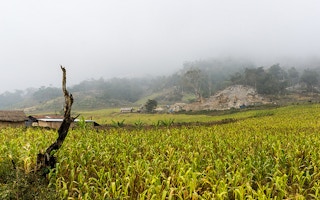Lao prime minister Thongloun Sisoulith has ordered officials in a heavily-polluted southern province of the country to reject proposals for new mining projects in their area, citing severe damage already caused to the local environment, sources in the country said.
Speaking on June 16 at a top-level meeting of officials in southeastern Laos’ Attapeu province, Thongloun said the government has decided not to approve new applications to operate mines that have turned water in the region “muddy and polluted.”
“In particular, many applicants will submit proposals to you to allow them to excavate gold along the Xekaman river, but this has caused muddy and polluted water throughout the year,” Thongloun said, according to a posting on the Attapeu province Facebook page.
“Attapeu province has had enough!” Thongloun said.
“Do not submit new proposals to the government for surveying for new mines,” he said.
Two large mines already approved to operate as concessions in Attapeu—one run by a Vietnamese military company and the other by a Chinese firm—can continue their work, “but must be closely monitored,” Thongloun said.
“
Attapeu province has had enough!
Thongloun Sisoulith, Lao Prime Minister
River can’t be used
Speaking on June 27 to RFA’s Lao Service, a Lao villager living near the Xekaman river in Attapeu’s Phouvong district said that he and others living in the area “no longer dare to use the river because of chemical substances found in the water.”
“Last year, children swimming in the river developed rashes on their skin. And now people won’t collect vegetables and mushrooms growing along the river’s banks,” the villager said, speaking on condition of anonymity.
“The water has been muddy for many years, which has resulted in a lack of fish,” he said.
“Last year I caught a few small fish and found mud in their stomachs. This means there has not been much in the river for them to eat since the digging for gold began.”
‘Great damage’
“Logging and mining have already caused great damage to the province so far,” one provincial official said, also speaking on condition he not be named.
“The forests in the province are gone, and land has been grabbed for concessions. And the water has been so badly polluted that people can no longer use it.”
“Even though excavation in the Xekaman river has been stopped, the water in the river will never return to normal,” he said.
MIning is a key source of revenue for landlocked Laos, with copper the most commonly mined commodity in the country, followed by iron ore and gold.
Amid efforts to draw profit from the extraction of its mineral resources, the impoverished country has often turned a blind eye toward mining firms that pollute the environment, environmental experts say.
Reported and translated by Ounkeo Souksavanh for RFA’s Lao Service. Written in English by Richard Finney.
Copyright © 1999-2014, RFA. Used with the permission of Radio Free Asia, 2025 M St. NW, Suite 300, Washington DC 20036.










